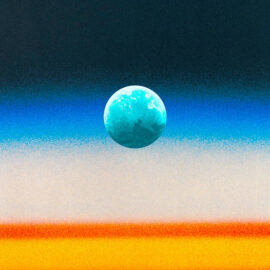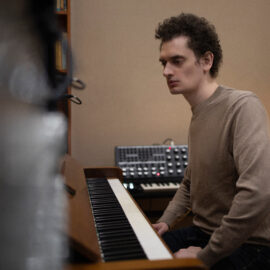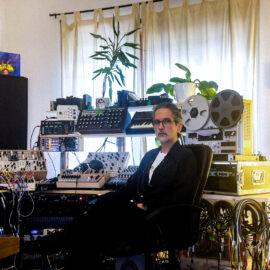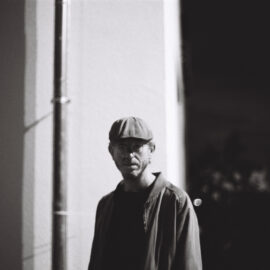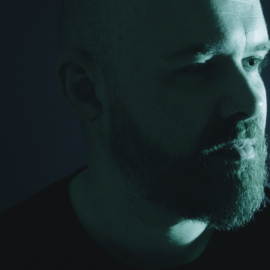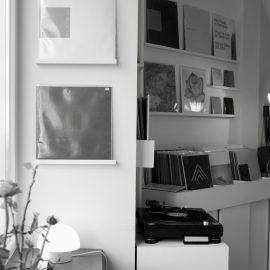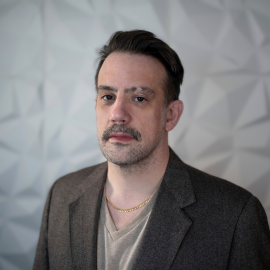Interview by Joachim Spieth.
Republished on Headphone Commute with permission from the author.
British-born, US-based artist James Clements, better known to most as ASC, has been musically active for more than two decades. With more than 20 albums and collaborations with labels such as Auxiliary (of which he is the operator), Silent Season, Horo, and Semantica we need no further words to introduce him. Some time ago we made our first contact and have remained in exchange thanks to our friends from Headphone Commute and 9128. All this was a good opportunity to ask him a few questions, the answers to which I will share with you here.
— Joachim Spieth
A lot has already been communicated about your studio setup (see HC’s “In the studio with ASC“). What I would be very interested in, however, is your workflow. Your output is high and I was wondering how fast you work on an album. In which way did you optimise your production process, is there a strict separation between sound production and later arranging or mixing or does it follow spontaneous inclinations?
I’ve consciously streamlined my workflow over the years, to the point where everything happens organically when I’m producing a piece of music. The writing, the mixing, EQ’ing etc. all happen simultaneously. I’ve found that by approaching my tracks this way, I’m left with a much more concise picture at the end of the sessions. I’m able to realise my initial ideas a lot easier this way, as I’m seeing things like a sculptor would. Having less “tidy up” work to do at the end of a track also makes the process a lot more enjoyable for me too. It’s also very easy to get distracted and fall out of the practice of certain routines, so when I feel that happening, I try to discipline myself by using only a few effects in a signal chain, or by limiting the number of synthesizers I use in a specific track. My studio is mainly hardware-based, so it’s very easy to get caught in the loop of tweaking one bit of kit, then switching on another after being inspired by an idea from a particular type of synthesis for example, and then I find myself not getting anywhere close to finishing a track. This can be great for the creative process when trying to come up with new ideas, but obviously very detrimental to workflow when time is at a premium and working to a deadline for scores.
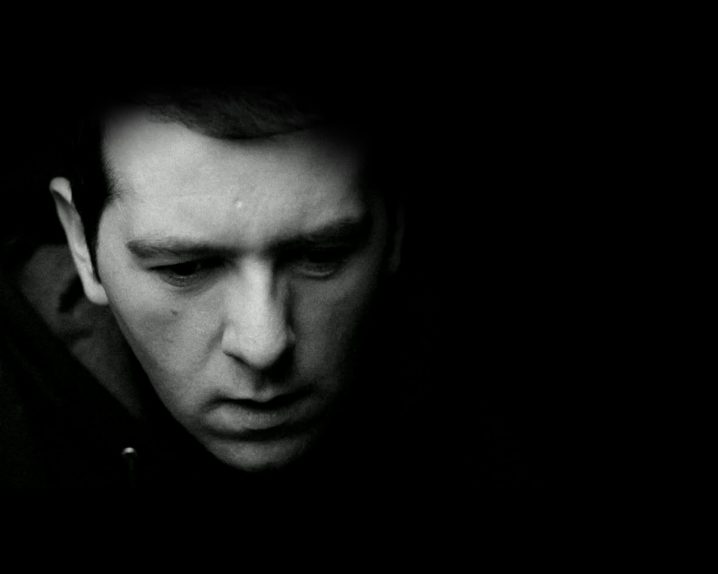
Especially with regard to your high creative output: how do you recharge your batteries, especially after an album, you often have the feeling that you have said everything for the moment?
I’m fortunate that I don’t often suffer from writer’s block or burnout, and when it happens, it’s usually once in a blue moon. I’m very grateful for that, as I know plenty of artists that are only able to create one album or a handful of 12” releases a year, and that’s all they feel they have in them. I’m definitely not immune though, and when I’ve suffered in the past, I usually just force myself to step away from the creative process and just let the batteries recharge naturally. I’m usually very creative though, as I always feel I have so much to say musically. I write a lot of different genres too, so that also helps if I’m starting to get bored or feel like things are getting stale with a specific style, then I can just easily turn my attention to one of the many genres I enjoy writing and carry on. Creation is a cathartic process for me, and I’m drawn to it like a moth to light. It’s almost a compulsion in a way, but as long as there’s balance in my life, I feel happiest when creating. I’m fortunate for this to be the status quo in my day-to-day routine.
Does recording live studio sessions play a bigger role for you, or do your works tend to be more small-scale?
I’ve never done this, although I’m open to it at some point. I like to work alone mainly. As I touched upon in the previous answer, creation is very cathartic and can often be a very meditative mind state. I love the isolation and solitude writing alone provides, as there’s nothing better to me than getting immersed in your own world and having full control over that without any distractions.
You also work for film music and TV commercials. Can you outline the way there? Are most of your assignments in this field strictly regulated by the clients’ specifications, or do you have relative freedom to deliver results because they consciously want your musical authenticity?
This differs with every project. All of the films I’ve scored so far have had a different approach, mainly due to the director’s vision. Some have been very “hands-on”, and you have to adapt and cater to their vision, as it’s very different from just writing for a general release. Scoring films is a collaborative effort, as you’re working with the director to provide accompanying elements to what’s on screen at a specific time. Other directors have been less “hands-on” though, and have simply let me run with it and have complete creative control. I don’t mind both approaches, as the end result is equally rewarding. I love seeing how my music can elevate a particular scene, by adding to the emotion portrayed by the actors and what’s happening on screen. It’s a beautiful thing.
You have founded and managed several labels since the beginning of your career and have a wealth of experience in this regard. For a few years now, we have seen a flood of new labels being distributed via content aggregators through countless stores, so in my opinion, the importance of labels has rather diminished, making it more difficult to be rediscovered by potentially interested listeners. Do you have a similar view, and if so, how do you deal with this fact?
I still feel the label has a very important part to play, but mainly for the listener. A label represents quality control, curation, and most importantly – trust. I know that when I’m looking for music to consume and enjoy, if I connect with a label or artist’s music on some level, I’m building up an aspect of trust and respect subconsciously. If I start digging deeper, and hypothetically this artist has their own label, I’m more likely to buy into their vision and trust their curation. In this aspect, a label is very important to me and will always represent this connection.
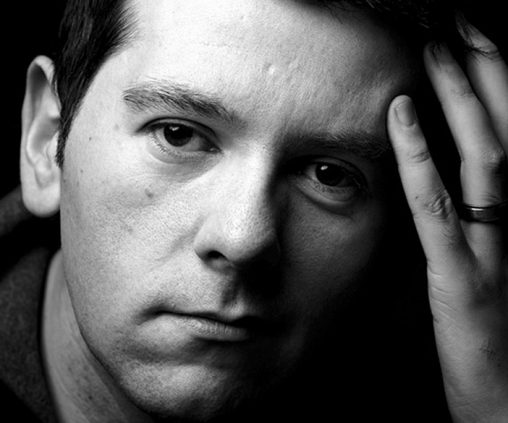
In your biography, “emotion” is mentioned at the end as the source of inspiration for your work. Now, music can never be created without emotion, but I understand why the writer focuses on “emotion”. At the risk of seeming silly, I’ll try to find out what kind of emotion leads to satisfying results in your production process. In my creative process, emotion mostly oscillates between the poles… and it is not always clear which one has the upper hand. That’s where I see the tension.
I’m always looking for something in a composition to move me. I need to feel something from the music I’m listening to. It’s what drew me to deep underground music from an early age. Even before I knew I was searching for something, I wasn’t finding it in commercial music. I’d dig through my mum’s collection of soul and Motown records from the ’70s before I was even 10 years old. I was drawn to the emotion these records had. Again, this was exactly what drew me into my first music love, atmospheric drum & bass. Hearing LTJ Bukem DJ in 1995 changed my life. I’d finally found this form of emotive expressive music that I could connect with, and it felt like it was mine. This shaped my overall view of what I was looking for in music and the type of emotion I keep searching for within all forms of deep music. It 100% shaped the ASC sound in all that I create to this very day.
